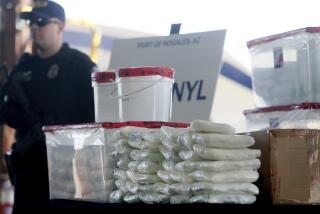Shortfall Remains in Drug War Pledges
- Share via
BOGOTA, Colombia — Struggling to put the best face possible on lukewarm support for this country’s anti-narcotics program, officials here announced Tuesday a contribution of about $180 million from European and other foreign donors.
The pledge from the European Union, Japan, Canada and several other nations leaves a shortfall of about $700 million in anticipated foreign contributions to the $7.5-billion anti-drug effort known as Plan Colombia. In addition, the new money will be given over six years, rather than the requested three-year period.
The United States has pledged $1.3 billion, primarily in the form of military aid.
The lack of enthusiasm from other countries is generally interpreted as a sign of misgivings about the overall strategy. The plan emphasizes crop eradication, which will put drug enforcement officers on the front lines of this nation’s long-running guerrilla war.
Colombia’s insurgents guard drug crops and receive part of their financing from “taxes” on crops. The South American nation supplies three-fourths of the world’s cocaine and an increasing share of the heroin sold in the United States.
Europeans want to differentiate their support by promoting Colombia’s effort to strengthen its courts and police, improve respect for human rights and give farmers incentives to grow crops other than opium poppies and coca, said a source close to the negotiations.
“There is a lot of uncertainty,” said Jaime Tenjo, director of economics at Javeriana University in Bogota, the capital. “People are afraid that in the short term there will be more combat, more death and more human rights abuses.”
The size of Tuesday’s donation provoked an additional concern: that the government here might have to lower its expectations for foreign funding of Plan Colombia. It had already expected to pay for the bulk of the plan and had budgeted $3.15 billion over three years for anti-narcotics operations and social spending.
An additional $1.75 billion was to have been raised through special taxes and international loans. That left $2.6 billion to be raised from foreign contributions.
Most of the U.S. contribution will go toward buying 58 helicopters and for training and equipment for three elite anti-narcotics battalions. About one-third of the U.S. aid for Plan Colombia will be spent on anti-drug efforts in neighboring countries.
The United Nations, Spain and Norway also have contributed to the plan.
Although the military plan appears to be taking shape, the Colombian government has yet to fully secure financing for the plan’s social component: programs to feed and shelter refugees who flee military actions and efforts to persuade coca farmers to find another livelihood.
Speaking to reporters Tuesday evening, Colombian Foreign Minister Guillermo Fernandez de Soto insisted: “This is not about numbers. It’s about the beginning of a process . . . that is significant for our country and our peace process.”
Fernandez had earlier rejected charges that foreign contributions are coming up short, insisting that there is no deadline on efforts to win financial backing.
More to Read
Sign up for Essential California
The most important California stories and recommendations in your inbox every morning.
You may occasionally receive promotional content from the Los Angeles Times.













